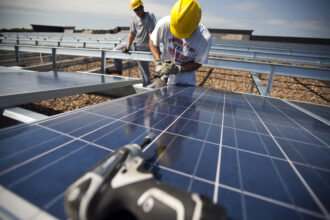Scientists Issue Plea for Action on Climate Change (Guardian)
More than 2,500 climate experts issued a desperate plea last night for world leaders to curb emissions or face an ecological and social disaster. Despite mounting evidence, economist Nicholas Stern says politicians are failing to act. Scientists fear their message isn’t getting through.
Partisan Lines Blur in Fight to Influence US Climate Law (Washington Post)
President Obama’s endorsement of climate legislation has set off a lobbying rush in Congress. Coal companies, utilities, economists and environmentalists are vying to shape legislation that could rechannel hundreds of billions of dollars.
U.S. Biodiesel Makers say EU Fees Will Kill Exports (Reuters)
U.S. biofuel producers said the EU’s anti-dumping tariffs will kill their exports to Europe. Starting today, U.S. exporters will have to pay additional anti-dumping tariffs of up to 29 percent, plus anti-subsidy duties.
Marcellus Shale Drilling Making Rural Residents Ill (Reuters)
Some geologists believe the Marcellus shale has the potential to meet total U.S. natural gas needs for a decade or more. But Pennsylvania residents say the highly toxic chemicals necessary for drilling are sickened their families and livestock.
US Unprepared for Climate Change, Say Policy Advisers (AP)
The U.S. is woefully unprepared for climate change and needs to rethink basic assumptions that govern things as varied as choosing cars and building bridges, the National Research Council says.
Another Coal Plant Project Bites the Dust (Las Vegas Sun)
A second power company in as many months is shelving plans to build a coal-fired power plant in Nevada because of the rising costs and expected regulations from Washington. LS Power plans to focus on improving transmission instead.
Rush for Coal Plants Slows to a Stagger (Kansas City Star)
If the Sunflower Electric Power Corp. coal-fired power plants are built in Kansas — and that’s still an if — they could be among the last built for quite a while.
WWF: 1973 Polar Bear Agreement Requires Climate Action (Marketwire)
An agreement signed in 1973 obliges the five Arctic countries with polar bear populations to take action on climate change, the WWF says.
Ireland Closer to Kyoto Target Due to Economic Slump (Irish Times)
Officials are expected to confirm today that the slowdown in economic activity has led to a dramatic reduction in greenhouse emissions in Ireland, putting the country much closer to its Kyoto protocol goals.
VW on Electric Cars: ‘Please, Lower Your Expectations’ (Reuters)
Volkswagen’s U.S. chief says it will be 35 years before electric cars make up a significant portion of the world’s auto market. That pessimism didn’t sit well with the California students listening to him.
Norway’s Think Plans US Electric Car Plant (Fortune)
Norwegian electric car company Think announced plans to open a factory in the United States in 2010 to produce its City urban runabout. Eight states are vying for the factory, including Michigan.
Europe’s Way of Encouraging Solar Power Arrives in the U.S. (New York Times)
If solar and wind are to become as common on the U.S. plains and rooftops as they are abroad, it may be because the feed-in tariff, the financing technique that gave Europe an early lead in renewable energy, is starting to cross the Atlantic.
Wind Shifts May Stir CO2 From Antarctic Depths (Science Daily)
Natural releases of CO2 from the Southern Ocean due to shifting wind patterns could have amplified global warming at the end of the last ice age, and could be repeated as manmade warming proceeds, a report in the journal Science suggests.
Don’t Make the Phytoplankton Mad (Reuters)
Microscopic sea plants in waters surrounding Antarctica are excellent markers for climate change because they respond quickly to varying environmental conditions. A study in the journal Science shows they’re suffering, and that has consequences all the way up the food chain.
Energy Efficiency: Cinderella at the Climate Policy Ball (Guardian)
A British competition among neighborhoods to increase their energy efficiency offers some important lessons for government policies everywhere: personal energy use monitoring and incentives work.
About This Story
Perhaps you noticed: This story, like all the news we publish, is free to read. That’s because Inside Climate News is a 501c3 nonprofit organization. We do not charge a subscription fee, lock our news behind a paywall, or clutter our website with ads. We make our news on climate and the environment freely available to you and anyone who wants it.
That’s not all. We also share our news for free with scores of other media organizations around the country. Many of them can’t afford to do environmental journalism of their own. We’ve built bureaus from coast to coast to report local stories, collaborate with local newsrooms and co-publish articles so that this vital work is shared as widely as possible.
Two of us launched ICN in 2007. Six years later we earned a Pulitzer Prize for National Reporting, and now we run the oldest and largest dedicated climate newsroom in the nation. We tell the story in all its complexity. We hold polluters accountable. We expose environmental injustice. We debunk misinformation. We scrutinize solutions and inspire action.
Donations from readers like you fund every aspect of what we do. If you don’t already, will you support our ongoing work, our reporting on the biggest crisis facing our planet, and help us reach even more readers in more places?
Please take a moment to make a tax-deductible donation. Every one of them makes a difference.
Thank you,











